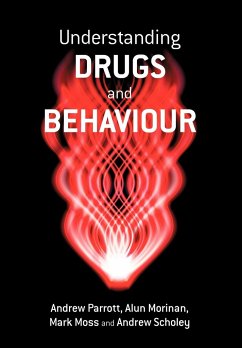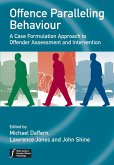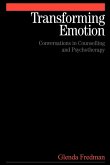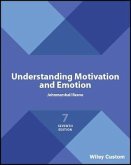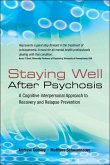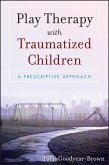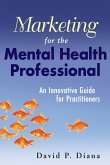Andrew Parrott (UK University of Wales Swansea), Alun Morinan (UK University of East London), Mark Moss (UK University of Northumbria at Newcastle)
Understanding Drugs and Behaviour
Andrew Parrott (UK University of Wales Swansea), Alun Morinan (UK University of East London), Mark Moss (UK University of Northumbria at Newcastle)
Understanding Drugs and Behaviour
- Broschiertes Buch
- Merkliste
- Auf die Merkliste
- Bewerten Bewerten
- Teilen
- Produkt teilen
- Produkterinnerung
- Produkterinnerung
Offers an introduction to the action that various drugs have on the brain and behaviour. This book covers drugs such as alcohol, nicotine, cannabis, LSD and Ecstacy, opiates, CNS stimulants, as well as clinical medications.
Andere Kunden interessierten sich auch für
![Offence Paralleling Behaviour Offence Paralleling Behaviour]() M DaffernOffence Paralleling Behaviour54,99 €
M DaffernOffence Paralleling Behaviour54,99 €![The Psychology of Interrogations and Confessions The Psychology of Interrogations and Confessions]() Gudjonsson, Gisli H., CBE (Institute of Psychiatry, King's College,The Psychology of Interrogations and Confessions71,99 €
Gudjonsson, Gisli H., CBE (Institute of Psychiatry, King's College,The Psychology of Interrogations and Confessions71,99 €![Transforming Emotion Transforming Emotion]() Glenda FredmanTransforming Emotion52,99 €
Glenda FredmanTransforming Emotion52,99 €![Understanding Motivation and Emotion Understanding Motivation and Emotion]() Johnmarshall Reeve (University of Iowa)Understanding Motivation and Emotion61,99 €
Johnmarshall Reeve (University of Iowa)Understanding Motivation and Emotion61,99 €![Staying Well After Psychosis Staying Well After Psychosis]() Andrew Gumley (UK University of Glasgow)Staying Well After Psychosis55,99 €
Andrew Gumley (UK University of Glasgow)Staying Well After Psychosis55,99 €![Play Therapy with Traumatized Children Play Therapy with Traumatized Children]() Paris Goodyear-BrownPlay Therapy with Traumatized Children62,99 €
Paris Goodyear-BrownPlay Therapy with Traumatized Children62,99 €![Marketing for the Mental Health Professional Marketing for the Mental Health Professional]() David P. DianaMarketing for the Mental Health Professional38,99 €
David P. DianaMarketing for the Mental Health Professional38,99 €-
-
-
Offers an introduction to the action that various drugs have on the brain and behaviour. This book covers drugs such as alcohol, nicotine, cannabis, LSD and Ecstacy, opiates, CNS stimulants, as well as clinical medications.
Produktdetails
- Produktdetails
- Verlag: John Wiley & Sons Inc
- Seitenzahl: 336
- Erscheinungstermin: 26. Mai 2004
- Englisch
- Abmessung: 244mm x 170mm x 18mm
- Gewicht: 584g
- ISBN-13: 9780471986409
- ISBN-10: 0471986402
- Artikelnr.: 12958437
- Verlag: John Wiley & Sons Inc
- Seitenzahl: 336
- Erscheinungstermin: 26. Mai 2004
- Englisch
- Abmessung: 244mm x 170mm x 18mm
- Gewicht: 584g
- ISBN-13: 9780471986409
- ISBN-10: 0471986402
- Artikelnr.: 12958437
Andy Parrott has published over 300 journal articles and conference papers, covering a wide range of psychoactive drugs. The first publications from his PhD at the University of Leeds were concerned with antipsychotic medications. Then, as a postdoctoral researcher with the Human Psychopharmacology Research Unit at Leeds University, he investigated the effects of second-generation antidepressants and benzodiazepines on cognitive performance and car-driving skills. Moving to the Institute of Naval Medicine in Hampshire, he was tasked with determining the practical utility of anti-seasickness medications, such as transdermal scopolamine, in land and sea trials. Further trials investigated the cognitive side effects of nerve agent prophylactics. At the University of East London he established the Recreational Drugs Research Group, which investigated a number of disparate topics: caffeine in shift workers, anabolic steroids in weightlifters, amphetamine and LSD in party goers and nootropics as potential ''smart drugs''. At Humboldt State University in California, he assessed the everyday functioning of excessive cannabis users. However, his two main research areas are nicotine and MDMA/Ecstasy. In an extensive research programme he has shown how nicotine dependency is psychologically damaging and causes increased psychological distress. The Recreational Drugs Research Group which he founded at the University of East London is, however, most well known for its work with recreational MDMA/Ecstasy users. Their cognitive research papers have been awarded the British Association for Psychopharmacology Organon prize on two occasions. Professor Parrott's work is featured regularly in the media. He sits on the editorial boards of leading psychopharmacology journals, and he has organised a number of international symposia. Recently, he moved to the University of Wales at Swansea. Here, he is continuing with a number of collaborative studies, including a large UK/US prospective study investigating the effects of recreational drug use during pregnancy. Alun Morinan graduated in Biochemistry from the University of Wales at Aberystwyth and went on to complete an MSc in Pharmacology at the University of London and a PhD in Neuropharmacology at the National University of Ireland in Galway. After postdoctoral research in Pharmacology at Galway and Biochemistry at the Institute of Psychiatry, he was appointed Lecturer in Pharmacology at North East Surrey College of Technology before moving to his current post of Principal Lecturer at the University of East London. His publications have been mainly in the fields of experimental psychopharmacology and neurochemistry covering topics such as alcohol dependence, anxiety, schizophrenia and enzymology. Mark Moss studied applied chemistry and spent 10 years in industry before returning to university to study Psychology. He completed his PhD in 1999 and was involved in the establishment of the Human Cognitive Neuroscience Unit at Northumbria University. His research portfolio has focused primarily on aspects of cognitive functioning in healthy young volunteers, with journal articles and conference presentations relating to both enhancement through natural interventions and drug-induced impairments. Mark is currently programme leader for the Division of Psychology at Northumbria University. Andrew choley is a Reader in Psychology at the Division of Psychology, Northumbria University, Newcastle-upon-Tyne. He has published hundreds of journal articles and conference papers, covering the cognitive effects of many recreational and medicinal drugs. His PhD and postdoctoral fellowship at the Brain and Behaviour Research Group, Open University, examined the neurochemical substrates of memory formation. He moved to Northumbria University in 1993, where his research has concentrated on the acute and chronic impairing and enhancing effects of various drugs including benzodiazepines, alcohol, caffeine, glucose, oxygen (with Mark Moss) and herbal extracts. In 1999 Andrew established the Human Cognitive Neuroscience Unit, of which he is the director. The work of this unit concentrates on the potential for nonmainstream treatments to enhance cognitive performance. These have ranged from metabolic interventions (notably glucose and oxygen) to low doses of alcohol and even to drinking water (in thirsty individuals) and to chewing gum. Andrew is also the co-director of the Medicinal Plant Research Centre. His present focus of research aims to disentangle the neurocognitive effects of herbal extracts, to attempt to identify relationships between their behavioural effects and their neurochemical properties and to identify safe treatments that may be effective in the treatment of conditions where cognition becomes fragile, including dementia. He is currently involved in trials examining the effects of herbal extracts in Alzheimer's disease. Andrew is also committed to the public dissemination of science which has led to numerous appearances in the print, radio and television media.
About the authors.
Preface.
Part I: Drugs and Their Actions.
1 Psychoactive drugs: introduction and overview.
2 The brain, neurons and neurotransmission.
3 Principles of drug action.
Part II: Non-medical Use of Psychoactive Drugs.
4 CNS stimulants: amphetamine, cocaine and caffeine.
5 Nicotine and cigarette smoking.
6 LSD and Ecstasy/MDMA.
7 Cannabis.
8 Heroin and opiates.
9 CNS depressants: alcohol, barbiturates andbenzodiazepines.
10 Alcoholism and drug dependence.
Part III: Clinical and Medicinal Use of Drugs.
11 Antipsychotics for schizophrenia.
12 Antidepressants and mood stabilizers.
13 Nootropics for Alzheimer's disease.
14 Cognitive enhancers.
Part IV: Final Overview.
15 Current knowledge and future possibilities.
Glossary.
Key psychopharmacology and addiction journals.
Internet sources of information about psychoactive drugs.
References.
Index.
Preface.
Part I: Drugs and Their Actions.
1 Psychoactive drugs: introduction and overview.
2 The brain, neurons and neurotransmission.
3 Principles of drug action.
Part II: Non-medical Use of Psychoactive Drugs.
4 CNS stimulants: amphetamine, cocaine and caffeine.
5 Nicotine and cigarette smoking.
6 LSD and Ecstasy/MDMA.
7 Cannabis.
8 Heroin and opiates.
9 CNS depressants: alcohol, barbiturates andbenzodiazepines.
10 Alcoholism and drug dependence.
Part III: Clinical and Medicinal Use of Drugs.
11 Antipsychotics for schizophrenia.
12 Antidepressants and mood stabilizers.
13 Nootropics for Alzheimer's disease.
14 Cognitive enhancers.
Part IV: Final Overview.
15 Current knowledge and future possibilities.
Glossary.
Key psychopharmacology and addiction journals.
Internet sources of information about psychoactive drugs.
References.
Index.
About the authors.
Preface.
Part I: Drugs and Their Actions.
1 Psychoactive drugs: introduction and overview.
2 The brain, neurons and neurotransmission.
3 Principles of drug action.
Part II: Non-medical Use of Psychoactive Drugs.
4 CNS stimulants: amphetamine, cocaine and caffeine.
5 Nicotine and cigarette smoking.
6 LSD and Ecstasy/MDMA.
7 Cannabis.
8 Heroin and opiates.
9 CNS depressants: alcohol, barbiturates andbenzodiazepines.
10 Alcoholism and drug dependence.
Part III: Clinical and Medicinal Use of Drugs.
11 Antipsychotics for schizophrenia.
12 Antidepressants and mood stabilizers.
13 Nootropics for Alzheimer's disease.
14 Cognitive enhancers.
Part IV: Final Overview.
15 Current knowledge and future possibilities.
Glossary.
Key psychopharmacology and addiction journals.
Internet sources of information about psychoactive drugs.
References.
Index.
Preface.
Part I: Drugs and Their Actions.
1 Psychoactive drugs: introduction and overview.
2 The brain, neurons and neurotransmission.
3 Principles of drug action.
Part II: Non-medical Use of Psychoactive Drugs.
4 CNS stimulants: amphetamine, cocaine and caffeine.
5 Nicotine and cigarette smoking.
6 LSD and Ecstasy/MDMA.
7 Cannabis.
8 Heroin and opiates.
9 CNS depressants: alcohol, barbiturates andbenzodiazepines.
10 Alcoholism and drug dependence.
Part III: Clinical and Medicinal Use of Drugs.
11 Antipsychotics for schizophrenia.
12 Antidepressants and mood stabilizers.
13 Nootropics for Alzheimer's disease.
14 Cognitive enhancers.
Part IV: Final Overview.
15 Current knowledge and future possibilities.
Glossary.
Key psychopharmacology and addiction journals.
Internet sources of information about psychoactive drugs.
References.
Index.
"...useful resource for a wider range of health and social carestaff...takes a constructively critical approach to mainstreamassumptions..." (Care and Health, 17th August, 2004)
"...really helps the reader to understand bothconditions and treatments...a very informative and usefulresource..." (Accident & Emergency Nursing, No.13,2005)
"The coverage of the behavioural effects of a number ofrecreational substances is clear and informative, with particularlyfine chapters on nicotine and cannabis" (PsychologicalMedicine, Vol.35 2005)
"...really helps the reader to understand bothconditions and treatments...a very informative and usefulresource..." (Accident & Emergency Nursing, No.13,2005)
"The coverage of the behavioural effects of a number ofrecreational substances is clear and informative, with particularlyfine chapters on nicotine and cannabis" (PsychologicalMedicine, Vol.35 2005)

